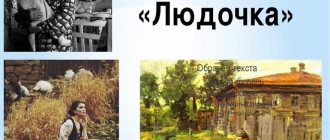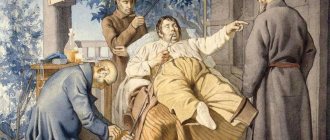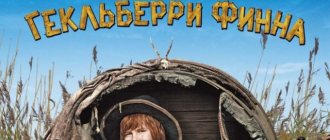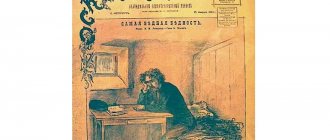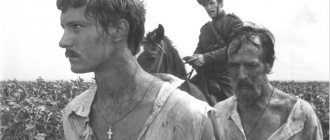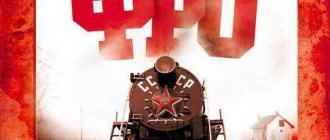Summary of “The Gifts of the Magi” by O. Henry
On Christmas Eve, Della counts the money she has saved. But the sum of one dollar and eighty-seven cents brings her to tears. With that amount she will not be able to buy anything as a gift for her husband. Therefore, Della decides to sell the most expensive thing she has - her very long and beautiful brown hair. She sells her hair for $20 and buys a platinum chain (for $21) for Jim's gold pocket watch, which he inherited from his father and grandfather. Della then returns home and waits for her husband.
Returning from work and seeing his wife without beautiful hair, Jim was shocked, and Della began to reassure him that she did it for him, and that the hair would grow back. After the couple hugs, Jim throws a package on the table. Having unwrapped it, Della is delighted, and then upset, because the package contained a set of hair combs that she had liked for so long. She says her hair will grow back quickly and gives her gift to Jim. But as you might have guessed, Jim sold his gold watch in order to buy a gift for his wife.
Analysis of the work
Description of the work
The narration is told on behalf of the author. On the eve of the Christmas holidays, a young married couple is frustrated by the lack of money to buy gifts for each other. Della Dillingham sells her luxurious locks to buy a platinum chain for his pocket watch as a gift to her beloved husband. But loving Della’s plans did not come true - her precious husband sold the watch, for which the gift from his beloved wife was intended.
The denouement of the story is as unexpected as it is beautiful - Jim sold his most expensive thing in order to please his beloved wife with a gift she had long desired - a set of combs for her beautiful brown hair.
Brief Analysis
One of the outstanding examples of a short story with an unpredictable ending, “The Gift of the Magi,” was written in 1905. The author wrote his story in a small tavern in New York City. The miniature novella, which meets all the characteristics of O. Henry’s talent, immediately gained popularity and recognition from readers. The story was first published in 1906 in the writer’s collection “Four Million.”
Theme : Self-sacrifice for love, wisdom and generosity of ordinary people, mutual devotion.
Composition - The novella begins with an exposition that describes the room of the Dalingham couple. Next comes the plot, where a young woman decides to sell her hair in order to buy a gift for her husband. Climax - gifts are bought. The denouement of the novella - Jim and Dell sold the most expensive thing they had, and the things they bought as gifts were of no use; an unexpected denouement is a feature of the composition.
Genre - The work belongs to the short story genre.
Subject
The great American writer was always sensitive to social inequalities. He understood well that “little” ordinary people have all human feelings, and, when faced with difficult life circumstances, these people prioritize deep spiritual qualities that help them survive.
In his work, he talks about the true love of two young people, about their devotion and dedication, self-denial and sacrifice. Jim and Dell live in a cheap apartment, the most expensive thing they have is Dell's luxurious hair and Jim's gold watch. The touching love of a young couple works wonders: these people, without hesitation, sell the most expensive things to give each other gifts for the Christmas holiday. The gifts turn out to be unnecessary: there is no luxurious hair that could be pinned up with tortoiseshell combs, and there is no watch that could be hung on a chain. And these gifts are priceless - Jim and Dell gave each other love, spiritual closeness, mutual understanding and devotion.
You may also be interested in the article: Ostrovsky’s play “Dowry” - analysis of the work
That’s why the writer called his work “The Gifts of the Magi.” He showed real human values. “Little” people turned out to be above everything petty and vain; their gifts turned out to be more important and valuable than the gifts of the Magi.
Summary of the story
The action takes place in a tiny rented apartment with old furniture. Della is counting her savings. Despite strict savings, she managed to scrape together only about two dollars.
The girl is upset, because today is Christmas Eve, and she has nothing to give to her beloved husband, since this money is completely insufficient. Her only wealth is a luxurious head of hair.
Della throws on her old coat and runs out into the street. She enters the Hair Products salon, offering the owner to buy her hair. The owner values the coin at $20 and the girl agrees. Now she is happy because she will be able to use the money to find something special for her loved one.
Della goes looking for a gift. In one of the stores, her gaze falls on a platinum chain, which, in her opinion, will ideally complement her husband’s gold watch. This watch is the only worthwhile thing in their family; it was inherited from Jim by his grandfather. The husband wears them on an old, long-lost leather strap, which is why he tries not to take them out in public. The girl buys a chain for $21, giving away all the money she had. There is only change left in her pocket, but she hurries home inspired.
Della meets her husband
Upon returning home, Della tries to tidy up her hair by curling it with a curling iron. She worries about how Jim will perceive her new image, because now she has become somewhat like a boy.
On this day, her husband returns a little later than usual. He is amazed at the change in his wife's appearance and the fact that she has cut her hair. Della reassures him, saying that they will grow back soon, because she could not allow her loved one to be left without a gift on this special day.
Jim places a package on the table - a gift for his wife. The girl eagerly opens it, experiencing indescribable joy, which then gives way to tears: the package contained a set of beautiful tortoiseshell combs with stones, which she had dreamed of for so long and which she had been looking at for a long time at the store window. But now she has no hair, so she can't use it. With tears in her eyes, she hands her gift to her husband. Jim sat down heavily on the couch: he was forced to admit that he sold the watch because he also wanted to please his beloved with something worthwhile.
The main character suggests postponing gifts until the right time. Both gifts are valuable, but neither Jim nor his wife can use them at the moment, since they have neither hair nor watch. These surprises are similar to the gifts of the Magi - the wisest people among all mortals: these gifts, despite their value, the Virgin Mary also, in her time, could not take advantage of.
Composition
O. Henry begins his work with an exposition in which he describes the modest home of the main characters, the miserable and unsightly furnishings of the room. The author briefly and unobtrusively describes the characters themselves. From the picture painted, it becomes clear that young people love each other, although they live poorly, they live happily.
Next comes the beginning of the action. Tomorrow is Christmas, and Dell has no money, and the young woman decides to sell her hair in order to buy Jim an expensive chain for his valuable watch, because it is Jim's family heirloom. Climax - Dell sells his hair and buys the coveted chain. She hurries home and eagerly awaits her husband.
An unexpected outcome occurs: Jim returns home and looks at Dell with short hair with such a look that she becomes scared. The whole point is that the young man sold a family heirloom to buy his beloved wife tortoiseshell combs for her luxurious hair.
In the epilogue, the writer mentions the wise Magi and their gifts brought to the baby lying in the manger. But the wisest of the wise were these two young people who sacrificed their treasures in the name of love.
Excerpt characterizing the Gifts of the Magi
“You’re all about attacking, but you don’t see that we don’t know how to do complex maneuvers,” he said to Miloradovich, who asked to go forward. “They didn’t know how to take Murat alive in the morning and arrive at the place on time: now there’s nothing to do!” - he answered the other. When Kutuzov was informed that in the rear of the French, where, according to the Cossacks’ reports, there had been no one before, there were now two battalions of Poles, he glanced back at Yermolov (he had not spoken to him since yesterday). “They ask for an offensive, they propose various projects, but as soon as you get down to business, nothing is ready, and the forewarned enemy takes his own measures.” Ermolov narrowed his eyes and smiled slightly when he heard these words. He realized that the storm had passed for him and that Kutuzov would limit himself to this hint. “He’s having fun at my expense,” Ermolov said quietly, nudging Raevsky, who was standing next to him, with his knee. Soon after this, Ermolov moved forward to Kutuzov and respectfully reported: “Time has not been lost, your lordship, the enemy has not left.” What if you order an attack? Otherwise the guards won’t even see the smoke. Kutuzov said nothing, but when he was informed that Murat’s troops were retreating, he ordered an offensive; but every hundred steps he stopped for three quarters of an hour. The whole battle consisted only in what Orlov Denisov’s Cossacks did; the rest of the troops only lost several hundred people in vain. As a result of this battle, Kutuzov received a diamond badge, Bennigsen also received diamonds and a hundred thousand rubles, others, according to their ranks, also received a lot of pleasant things, and after this battle even new movements were made at headquarters. “This is how we always do things, everything is topsy-turvy!” - Russian officers and generals said after the Tarutino battle, - exactly the same as they say now, making it feel like someone stupid is doing it this way, inside out, but we wouldn’t do it that way. But people who say this either do not know the matter they are talking about or are deliberately deceiving themselves. Every battle - Tarutino, Borodino, Austerlitz - is not carried out as its managers intended. This is an essential condition. An innumerable number of free forces (for nowhere is a person freer than during a battle, where it is a matter of life and death) influences the direction of the battle, and this direction can never be known in advance and never coincides with the direction of any one force. If many, simultaneously and variously directed forces act on some body, then the direction of movement of this body cannot coincide with any of the forces; and there will always be an average, shortest direction, what in mechanics is expressed by the diagonal of a parallelogram of forces. If in the descriptions of historians, especially French ones, we find that their wars and battles are carried out according to a certain plan in advance, then the only conclusion that we can draw from this is that these descriptions are not true. The Tarutino battle, obviously, did not achieve the goal that Tol had in mind: in order to bring troops into action according to disposition, and the one that Count Orlov could have had; to capture Murat, or the goals of instantly exterminating the entire corps, which Bennigsen and other persons could have, or the goals of an officer who wanted to get involved and distinguish himself, or a Cossack who wanted to acquire more booty than he acquired, etc. But , if the goal was what actually happened, and what was a common desire for all Russian people then (the expulsion of the French from Russia and the extermination of their army), then it will be completely clear that the Tarutino battle, precisely because of its inconsistencies, was the same , which was needed during that period of the campaign. It is difficult and impossible to imagine any outcome of this battle that would be more expedient than the one it had. With the least tension, with the greatest confusion and with the most insignificant loss, the greatest results of the entire campaign were achieved, the transition from retreat to offensive was made, the weakness of the French was exposed and the impetus that Napoleon’s army had only been waiting for to begin their flight was given. Napoleon enters Moscow after a brilliant victory de la Moskowa; there can be no doubt about victory, since the battlefield remains with the French. The Russians retreat and give up the capital. Moscow, filled with provisions, weapons, shells and untold riches, is in the hands of Napoleon. The Russian army, twice as weak as the French, did not make a single attack attempt for a month. Napoleon's position is most brilliant. In order to fall with double forces on the remnants of the Russian army and destroy it, in order to negotiate an advantageous peace or, in case of refusal, to make a threatening move towards St. Petersburg, in order to even, in case of failure, return to Smolensk or Vilna , or stay in Moscow - in order, in a word, to maintain the brilliant position in which the French army was at that time, it would seem that no special genius is needed. To do this, it was necessary to do the simplest and easiest thing: to prevent the troops from looting, to prepare winter clothes, which would be enough in Moscow for the entire army, and to properly collect the provisions that were in Moscow for more than six months (according to French historians) for the entire army. Napoleon, this most brilliant of geniuses and who had the power to control the army, as historians say, did nothing of this.
